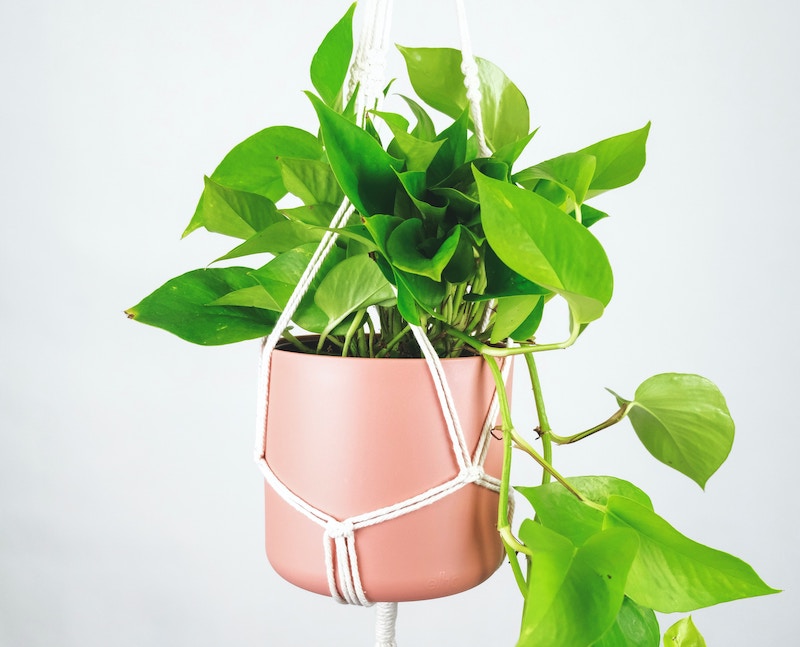Pothos plants are poisonous to children, pets, and adults. The leaves contain insoluble calcium oxalate crystals that can cause negative reactions due to their needle-like shape. While Pothos can be harmful if ingested, it will not be fatal. If any part of the plant has been ingested by a child or pet, contact your doctor or veterinarian for treatment.

Is Pothos Poisonous to Children?
Pothos is poisonous to children, toddlers and babies. It is not harmful for children to touch any part of the plant or the soil. It is dangerous for children to touch or ingest any juices that come out of the plant if the stems or foliage are ripped or torn. It is harmful for children of all ages to ingest any part of the plant. Ingesting even a little bit of the plant can cause irritation. It is best to keep your Pothos plant out of reach of your children.
Is Pothos Poisonous to Dogs?
Pothos is toxic for dogs of all ages but ingestion is not fatal. It is safe for dogs to come in contact with fully intact foliage and stems of Pothos. The juice inside Pothos stems and foliage may cause a skin reaction due to the calcium oxalate crystals within that cause irritation. It is also harmful for dogs to ingest any part of the plant. Signs of Pothos toxicity include appetite loss, barking, whimpering, difficulty breathing, burning and swelling of lips, tongue, and mouth, and excessive drooling. Contact your veterinarian if your dog is showing these symptoms. Dogs are not typically attracted to Pothos plants, but it is best to keep your Pothos plant out of reach and monitor your pet when it is near the plant.
Is Pothos Poisonous to Cats?
Pothos is toxic for cats of all ages but exposure is not fatal. It is safe for cats to come in contact with fully intact foliage and stems of Pothos. The juice inside Pothos stems and foliage may cause skin irritation. It is also harmful for cats to ingest any part of the plant. Signs of Pothos toxicity include pawing at the mouth, excessive drooling, pain in the mouth, and vomiting. Contact your veterinarian if your cat is showing these symptoms and you suspect they have ingested the plant. Most cats are not typically drawn to Pothos plants, but it is best to keep your pets away from houseplants, both for the health of the pet and for the plant.
Is Pothos Poisonous to Other Animals?
Pothos is poisonous to most animals if ingested because it contains oxalate crystals. Pothos is harmful to birds, rabbits, hamsters, ferrets, mice, rats and even reptiles. Do not allow any pet or animal to eat any parts of the plant. Doing so would cause digestive irritation and mouth swelling, similar to symptoms described for humans, cats and dogs.
Symptoms Of Pothos Poisoning
Pothos poisoning is not fatal but can cause some uncomfortable symptoms. Always check with your doctor or veterinarian for guidance if you suspect Pothos poisoning.
Here are some common symptoms to look out for:
- Swelling of the mouth, lips, or tongue
- Excessive Drooling
- Trouble Swallowing
- Vomiting
- Eye Irritation
Preventing Pothos Poisoning
It is important to prevent Pothos poisoning before it begins. When bringing a Pothos into your home, mindfully choose a location that will be out of the way from children and pets. This might include elevating the plant on a plant stand or shelf or even adding a physical barrier such as other plants or furniture. It is also important to closely monitor children and pets whenever they are near the plant to make sure they do not come too close to the plant.
Pet Poison Helpline
If something were to happen to your furry friend, and you suspect that they are suffering from Pothos poisoning, there is a poison control hotline to call for 24/7 vet advice. It is called the Pet Poison Hotline, and their phone number is (855) 764-7661.
Sources:
"Golden Pothos." American Society for the Prevention of Cruelty to Animals. aspca.org
"Pothos." American College of Veterinary Pharmacists. vetmeds.org
 |
Author Katie Endicott - Published 6-29-2023 |
